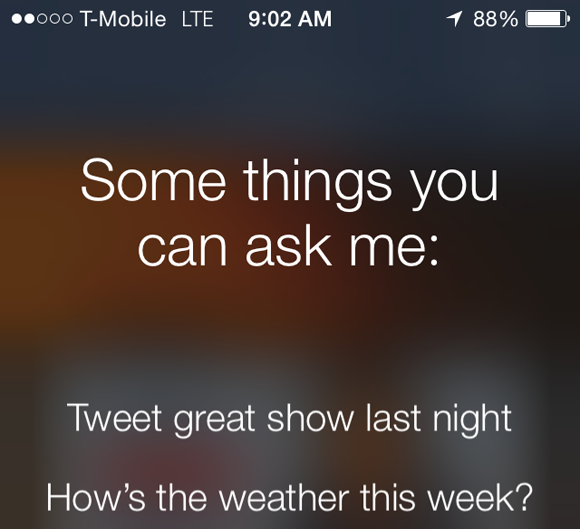
It's time it kick it up notch, Siri. Source: iPhone screenshot
New reports say Apple (AAPL +0.34%) is building a crack team of voice-recognition engineers and researchers to strengthen its own in-house team, which could replace Siri's back-end technology currently provided by Nuance (NUAN +0.00%). This comes as Siri is taking center stage in Apple's HomeKit and rumors are surfacing that Samsung is in talks to purchase Nuance.
Making Siri smarter
According to a recent Wired article, Apple's hiring over the past year points to a big push in shifting Siri's voice recognition technology to what's called "neural networking." This type of understanding allows voice-recognition systems to understand more spoken words, and their context, as additional words are added. Wired said Microsoft did research on this neural networking and found a 25% increase in voice recognition accuracy.
So, what does this have to do with Siri?
Unlike Google and Microsoft, Apple doesn't use neural networking for Siri -- at least not yet. A slew of voice recognition hiring to build up Apple's secret team in Boston could eventually replace the back-end recognition Nuance currently provides. This would boost Siri's understanding of voice commands and keep the technology on par with some of Apple's competitors. And it's coming at a pivotal time for the company.
What's at stake
There are several important factors playing out here, driving Apple to bring Siri's tech in-house. First is the possible sale of Nuance to Samsung. This isn't confirmed yet -- and may not happen -- but it's clearly a possibility the voice-recognition company could be snatched up at any time. The fact that Apple has never attempted to purchase the company may be a telling sign that the iMaker is content to use the technology until they've created something better. Obviously Siri wouldn't go away if Nuance was acquired, but it would spur Apple to develop its own tech even faster.

Siri on iPad and iPhone. Source: Apple
Secondly, I think we can be honest in saying that Siri is somewhat of a disappointment for iOS users. While the feature has gotten better since it's initial release, there's still much to be desired. Google's voice searches seem much more capable, likely because of its neural networking process. With the launch of Android Wear this month, Google will lean even harder on voice recognition and Apple needs to catch up. If Apple releases an iWatch this fall, voice recognition is going to be a big part of it, and right now I think Google's voice recognition is much stronger.
Lastly, Siri is about to take center stage on Apple's home automation platform, HomeKit. Siri will be able to take commands like "I'm going to bed" and then use the platform to turn off lights and lock the front door. This is huge for Apple considering that the home automation market is expected to be worth $16.4 billion by 2019 and Apple is rumored to be entering in the home automation hardware space as well.
This reliance on voice recognition for HomeKit and possibly even new hardware could make or break Apple's home automation success. If Siri can't clearly recognize commands, or understand them fast enough, then iOS users aren't going to rely on the virtual assistant to manage their connected home.
Apple said earlier this month that Siri on iOS 8 will process words as they are spoken and recognize songs. As wearables take off and home automation goes mainstream, updates like this won't be enough. Apple needs view Siri as the powerhouse technology it could be -- and needs to be -- not the side project it's always felt like.






